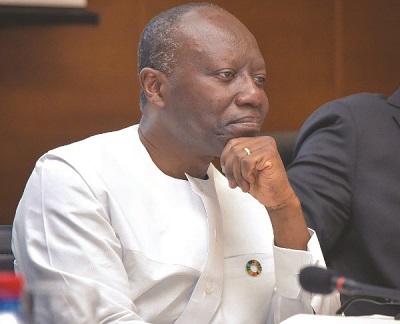
Politicians, parliamentarians, academics, investors, entrepreneurs, civil society organisations, and indeed, tax payers in Ghana have been debating the proposed introduction of an “Electronic Transaction Levy” or “E-Levy”in recent days, following the presentation of the 2022 Budget Statement to Parliament by the Minister of Finance, Mr. Ken Ofori-Atta, on November 17, 2021. The debate on the fairness and utility of the E-levy is at an impasse, and positions have become polarized.
The 2022 budget, coming under the theme “Building a Sustainable Entrepreneurial Nation: Fiscal Consolidation and Job Creation”, seeks to introduce a number of bold policy initiatives designed to restore macroeconomic stability with a focus on fiscal and debt sustainability in an extraordinary tough economic environment.
The theme of the budget is important and particularly timely when economic growth and job creation are such high priorities around the world. The single most important focus of the Sustainable Development Goals (SDGs) is to recognize that sustainable development means creating decent jobs – jobs that pay living wages and offer a chance to develop new skills (Goal 8), which reflects the aspirations of many Ghanaian youths today.
POVERTY AND SOCIAL EXCLUSION
Poverty and social exclusion remain key challenges in Ghanaand have become amplified during the recent domestic financial sector crisis and ongoing COVID-19 pandemic. Persistent jobless growth and its associated unemployment has reached crisis proportions, especially among the Ghanaian youth.
Data from the Labour Force Survey conducted by the Ghana Statistical Service (GSS) shows that the total unemployment rate for Ghana is 11.9%. According to the data from GSS, Ghana’s youth (15-24) unemployment rate has reached 25.9% – more than two times that of the adult population. Vulnerable employment is also high at 68.6%, indicating lack of decent work.
When employment opportunities in the formal wage economy are scarce, people are compelled to settle for low paying jobs in the informal sector, often through self-employment in the services sector. About 90% of the currently employed population are in the informal sector.
The COVID-19 pandemic has had a severe impact on economic activity in Ghana. In 2020, the Ghanaian economy recorded its lowest growth in over 25 years. Growth slowed to 0.4%, from 6.5% in 2019, and is only expected to recover to 5.1% by end of 2021.
Data from the World Bank’s World Development Indicators indicate that by the international poverty line of $5.50 a day, at 2011 international prices, more than half of the Ghanaian population are poor, living on less than $5.50 a day. Government debt now stands at some GH¢341.76 billion, or 77.8% of GDP, up from 54.2% at the end of 2017.
This means that, every adult Ghanaian citizen (18+ years) is indebted to Ghana’s creditors to the tune of about GH¢19,000. The total debt stock represented over 494% of total domestic revenue and over 617% of tax revenue. Interest payments on the public debt stands at some GH¢32.5 billion and is projected to rise to about GH¢37.4 billion by close of 2022, representing one of the fastest-growing items of expenditure in the budget. At present, interest payments on public debts consumes 59% of total tax revenue and 47% of total domestic revenue.
The mobilization of domestic finance is critical to success in obtaining resources to finance the investment needed to meet the laudable objectives in the 2022 Budget Statement.
Ideally, it would have been preferable for Ghana to use domestic savings to finance the required investments due, in part,to the fact that it is less volatile than most sources of external financing and does not increase the economy’s vulnerability to external shocks over which we have no control.
In response to rising public debts and tight fiscal space, one of the proposed revenue policy measures in the 2022 budget is the introduction of an E-Levyon all electronic transactions, ostensibly in hope of raising some additional GH₵6.9 billon.
We have followed closely the discourses written and spoken about the necessity and justification ofthe controversial E-Levy and hereby write this short policy brief to offer our impartial educated thoughts in the hope that they may add to improving the public debate and probably guide the Minister of Finance and Members of Parliament to make informed judgment about the way forward.
When we first heard of this E-Levy, we thought it was going to be a tax on electronic commerce, or commerce conducted through electronic networks or platforms.
In Ghana today, as in many other developing economies, there is a growing and flourishing informal sector where businesses make use of social media platforms such as Facebook Messenger and WhatsApp to sell and buy products. In contrast to businesses in formal brick and mortar stores, these informal businesses do not pay tax on sales they make through social media.
The COVID-19 pandemic has accelerated the deployment of ICTs in supporting business continuity and driving the economy, despite the catastrophic shutdown of business activity and consequent economic contraction caused by the virus.
E-commerce channels have deepened and expanded during the crisis, with a growing interest in digital processes and online purchasing in many countries.
The growth of the digital economy, and in particular online sales, has created additional complexity and increased the risks of underreporting, resulting in the loss of significant tax revenue to the state.
Every effort by the state to curb tax avoidance, tax fraud and tax evasion, and leakage of potential tax revenue should, therefore, be encouraged by all citizens as just and fair.
To our surprise, however, on reading the budget and listening to policy statements upon the proposed levy, it seems that the proposed E-Levy is,literally,a tax on mobile money (MoMo) payments.
This particular E-levy is neither consumption tax nor income tax. Economic theory and empirical evidence have taught us that taxes on financial transactions are among the least efficient tax handles to be considered by any country.
The E-Levy will affect only a segment of financial transactions that involve the transfer of resources from one person (business or individual) to another when the transaction takes place electronically.
HOW DESIRABLE IS
THE E-LEVY?
The E-Levy belongs to the class of tax instruments referred to generally as “financial transaction taxes (FTTs)”. FTTs is a generic name for taxes that are levied on transactions such as the sale and purchase of some sort of financial instrument such as stocks, shares, bank transactions or forex transactions.
The tax was originally intended to make financial markets more stable by discouraging excessive risk-taking. English Economist John Maynard Keynes was one of the first prominent proponents of such a tax.
In his General Theory of Employment, Interest Rates and Money, Keynes proposed a securities transactions tax to reduce destabilising speculation in equity markets.
To be continued
BY CHARLES GODFRED ACKAH & KWADWO OPOKU




